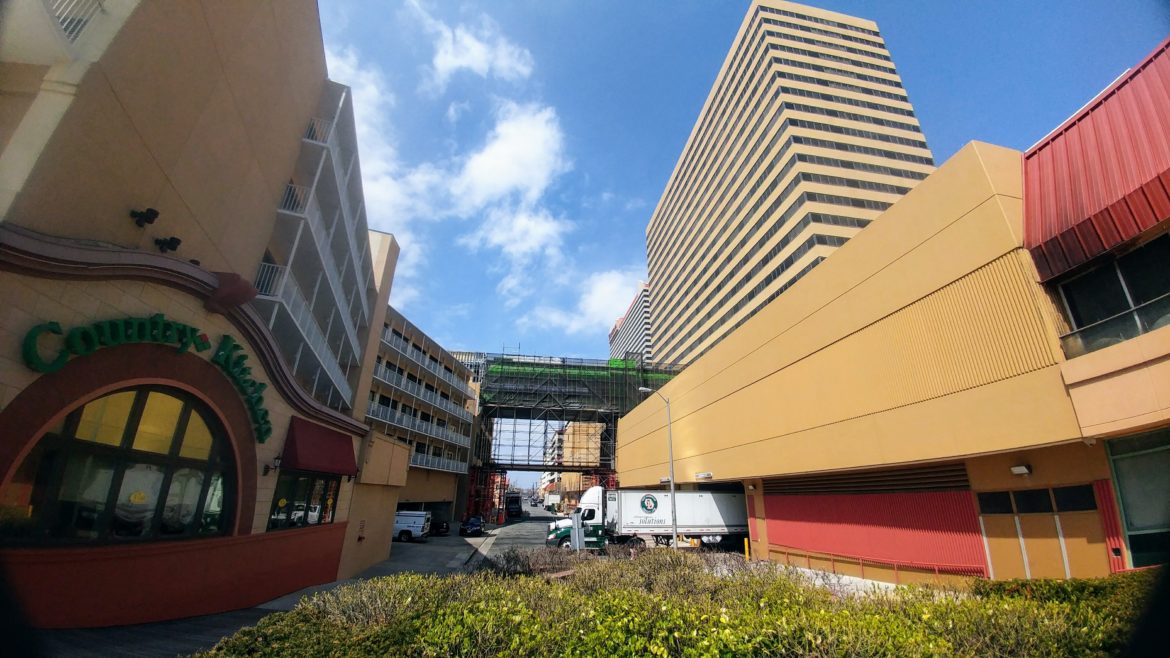Developers Curtis Bashaw and Craig Wood have ended their business relationship. Bashaw told the New Jersey Economic Development Authority of the relationship change in a request to restructure two defaulted loans.
Wood and Bashaw’s Cape Advisors developed over $1.5 billion in New Jersey and New York properties over 20 years. Bashaw is best known as the style-forward mastermind behind Congress Hall in Cape May and The Chelsea in Atlantic City. He has operated in political circles, including a stint as the boss of the Casino Reinvestment and Development Authority and a spot on the board of trustees of Stockton University. But his foray into Atlantic City ended last year amid multiple loan defaults and a forced sale to Carl Icahn.
Bashaw and Wood took on a $76 million mortgage in 2006 to convert a former Holiday Inn and Howard Johnson into The Chelsea Hotel. Bashaw dreamed big, spinning the “boutique” hotel as the place that would draw a hipper, younger crowd to Atlantic City. But by 2008, even with buy-in from future members of the influential Gov. Chris Christie-appointed Hanson Commission, the project needed an assist from the Economic Development Authority, which lent $7.2 million, in spite of one board member’s concern the EDA should use its financial firepower for new developments, rather than redevelopment. Bashaw promised The Chelsea would add 500 jobs to Atlantic City.
The developers’ split came shortly before Icahn’s announcement of a nearly $2 billion deal for Tropicana, which now owns the former Chelsea. The EDA has had to modify its unpaid loans to Cape Advisors for a third time. Now that repayment rests solely with Bashaw. Under the latest modification, Bashaw has agreed to pay down the outstanding balance over 7 years, at 1.5 percent. A spokeswoman for the EDA said in an email that she would hesitate to call the modifications of the loan “concessions”. “The agreed upon terms…establish a scenario wherein all funding will be repaid while minimizing risk and accommodating the borrower’s restructuring,” she wrote. Bashaw and Wood did not respond to requests for comment on their breakup and The Chelsea.
By last year, more than a decade after The Chelsea was first conjured up, Bashaw and Wood’s $76 million mortgage had increased to $92 million. They had paid the EDA less than $1 million for its $7.2 million in loans. Smelling a deal, billionaire Carl Icahn swept in to take over the bulk of the mortgage and the rights to the property. Icahn’s people informed the EDA that he was not above foreclosing on the hotel, a move that would have likely tied up the claims in court proceedings and delayed new hires to reopen the shuttered property, EDA officials speculated.
The EDA board agreed to let Icahn fast-track his vulturine swoop on the property.Meanwhile, Bashaw and Wood’s company had failed to meet the terms of their EDA loans, which were under the oversight of the EDA’s Special Loan Management team and had already been restructured once. But the state authority was reluctant to fight Icahn for the loan collateral. Instead, the EDA decided to restructure the Cape Advisors’ repayments based on nothing more than Bashaw and Wood’s personal guarantees. In an interview with Route 40 last summer, the EDA’s Chief Operating Officer Timothy Lizura stressed that giving up the Authority’s claim on The Chelsea as collateral and accepting the personal guarantees was not a special concession to the developers. The EDA was anxious to make sure its loans would be repaid and believed their personal guarantees were enough.
Icahn took over The Chelsea mortgage from a private investment pool known as a collateralized debt obligation. The investment pool received nothing when Icahn took over the mortgage, suggesting the debt had no financial value. He paid a symbolic $1 for the deed to The Chelsea, instead of foreclosing on Bashaw and Wood. He paid the EDA $100,000 in exchange for its agreement not to fight him over rights to the building. And the Authority also extracted an unusual promise as leverage from the billionaire: He was not to request EDA assistance in connection with The Chelsea property for up to two years.
In less than a year, Icahn had made good on his plan to connect The Chelsea to Tropicana via an elevated walkway (scheduled to open before Memorial Day). Bashaw struggled over a decade to market The Chelsea as a hipster hotspot and he failed in efforts to win a boutique casino license, in spite of his political connections. But in under 12 months, rebranded as The Chelsea tower at Tropicana and complete with a new restaurant – Atlantic City’s favorite pancake spot, Gilchrist’s – the property went from being the visual marker of multiple bad loans to the icing on the cake of an almost $2 billion casino deal.
Bashaw has little to show for his grandiose dreams after the breakup with Wood. His share of Cape Advisors includes the New Jersey properties – all in Cape May. Part of his Beach Plum farm and some bed and breakfasts now back his pledge to repay the EDA.
The EDA has no claim to the crown jewel of Bashaw’s holdings, Congress Hall, a mortgaged property that Bashaw inherited through the bankruptcy of his fundamentalist-preacher grandfather. His position is better than that of the EDA, however. Bashaw avoided foreclosure and kept his finances out of the glossy magazines he often appears in. The EDA, on the other hand, has lost the ounce of leverage it held over Icahn. And Icahn, sitting pretty after offloading the Taj Mahal and now Tropicana, is seeking $5.6 million in public funds to demolish the former Trump Plaza, his remaining Atlantic City holding.